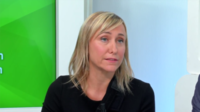"Nowadays, there is more attention paid on the issue of gender disparity" - An interview with Alaide Chieffo
Being a woman in the world of interventional cardiology: Dr. Chieffo gives us her impressions from Milan, Italy, where she practices.
We cannot lose talents and we definitely need more women fellows joining our amazing subspecialty.
Why are there still so relatively few women interventional cardiologists? Do you think that working conditions (e.g. exposure to radiation) may be an impediment on women embarking on this career path?
In my opinion, the reasons why there are still few women interventional cardiologists depend on multiple factors. Interesting insight comes from the recently published Gender-CATH Survey from GISE (Italian Society of Interventional Cardiology) (Bernelli et al. - JAHA 2021).
Women are more frequently childless, perceive pregnancy as a limitation for their career and ask for more gender-specific radioprotection tools. In addition, the limited number of female role models and a male-dominated working environment might play a role too.

Alaide Chieffo
What made you choose this specialty?
At the time I chose this subspecialty, I was amazed by the possibility of being able to save patients’ lives and/or relieve their symptoms, and by the rapid development of techniques and devices with the possibility of doing also research together with clinical work. I lived DES revolution, the beginning of TAVI and TMVR, development of LVAD and I was exposed to so many amazing new technologies.
What is the main obstacle you have encountered to become an interventional cardiologist? How did you manage to overcome this?
I encountered the same obstacles as all women entering this subspecialty and I managed with perseverance, hard work and passion. Still striving as all women working in a predominantly man's world and doing a job that takes you 24 hours a day.
From your point of view, what are the main assets you may have as a woman, compared with your male colleagues?
Honestly, I do not see any difference in this aspect between men and women.
Do you feel your patients have a different attitude to you because you are a woman? Do you feel your colleagues treat you differently because you are a woman?
At the beginning of my career, the patients, especially in emergency cases, frequently did not recognize me as the interventional cardiologist treating the case.
Sometimes I was addressed as “young lady”... Initially, I was quite annoyed but ageing, I make fun of it or simply I do not care anymore…
What advice can you provide to young women fellows wishing to pursue a career in interventional cardiology?
They have to know that it won’t be easy because of prejudices and full-time work but with hard work, perseverance and passion for their work, they can succeed. Nowadays, there is more attention paid to the issue of gender disparity and hopefully, our experience and support might be of help for them…
We cannot lose talents and we definitely need more of them joining our amazing subspecialty.



